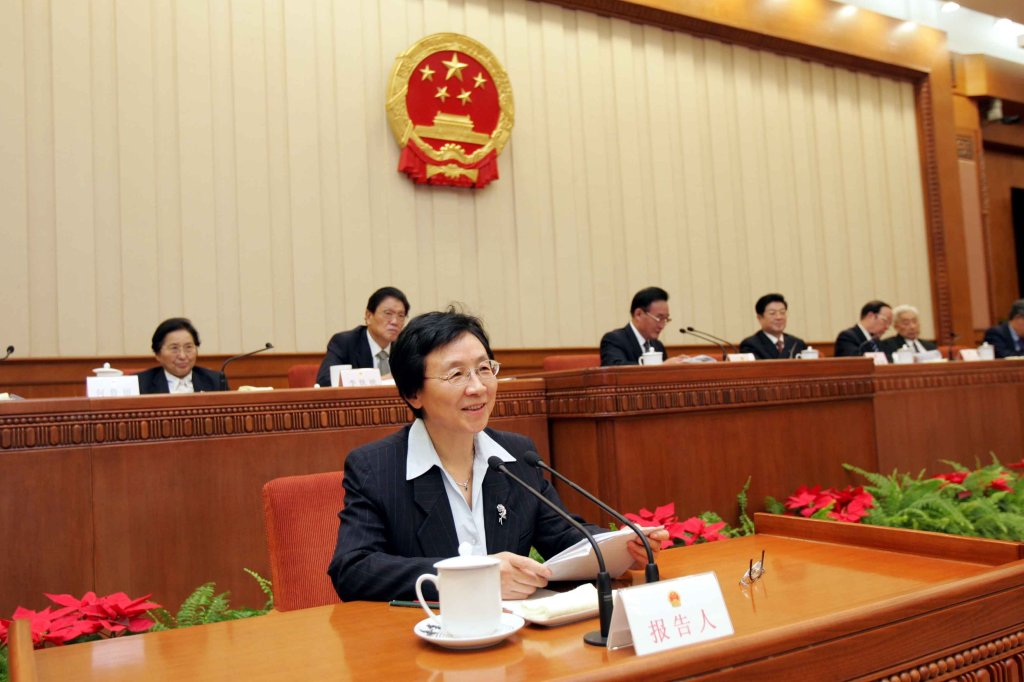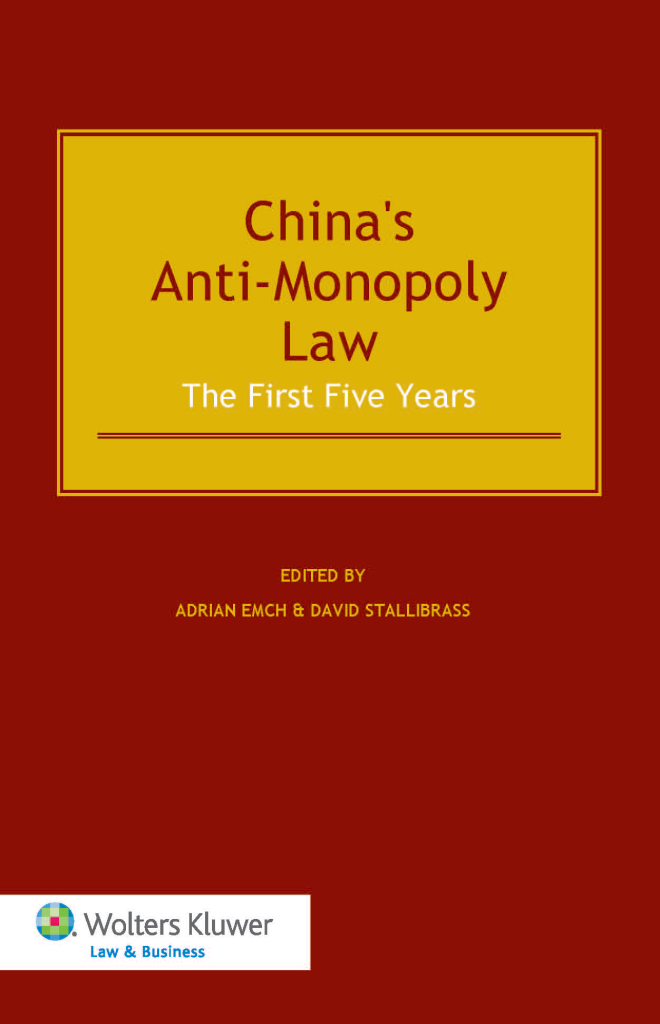
Professor Wang Xiaoye, Institute of Law, Chinese Academy of Social Sciences and advisor to the drafting committee of China’s AML, delivers a lecture to the 10th NPC Standing Committee in 2005 on the topic ‘Anti-Monopoly Law is the Basic Rule of Law to Maintain the Order of the Socialist Market Economy’.
Although the Chinese Anti-Monopoly Law (AML) has been in force for over six years, competition law enforcement has only considerably intensified in the past several months.
Today, competition law has become a key issue for companies doing business in China. Adrian Emch from Hogan Lovells, Beijing, analyses recent developments and says that companies in China need to strengthen their AML compliance and even be prepared to deal with the possibility of a dawn raid.
During the first months, perhaps years, following the AML’s entry into force in August 2008, the Chinese competition authorities maintained a relatively low profile. One reason was their limited manpower. But, equally, the officials at the National Development and Reform Commission (NDRC), the State Administration for Industry and Commerce (SAIC), and the Ministry of Commerce (MOFCOM)—the three authorities with AML enforcement powers—dedicated time to drafting AML implementation rules at the beginning of their AML mandate.
Over time, China’s competition authorities began to use their growing regulatory heft to investigate and decide on a number of significant cases. Of note, in early 2013, the NDRC imposed a (then) record fine of approximately EUR 43.6 million on a group of Korean and Taiwanese companies for fixing LCD panel prices. The substantial fine imposed in this case arguably portended the future of competition enforcement in China.
Fast forward to 2014 – on 28th July and 6th August, seven offices of software giant Microsoft were searched in simultaneous raids by around 100 officials from the SAIC and its local counterparts. In parallel, on 20th August, the NDRC announced its decision against 12 Japanese car part manufacturers for cartel behaviour, setting a new record in imposing a fine of around EUR 153 million in total.
Even the MOFCOM, which had been perceived as the most experienced of the three authorities, shocked observers by prohibiting the P3 cooperation plan of three large European shipping lines—Maersk, CMA CGM, and MSC—while the European Commission (EC) and the United States (US) authorities decided not to object to that plan.
These developments underscore how important it is now for companies operating in China to follow AML developments closely.
NDRC and SAIC investigations
The NDRC and the SAIC are responsible for investigating and sanctioning monopoly agreements and abuse of dominance conduct.
The day after the simultaneous dawn raids on Microsoft’s premises in Beijing, Shanghai and Guangzhou, the SAIC issued a statement explaining that it suspected Microsoft of engaging in illegal tying of the Windows operating system and Microsoft Office software with other products or services. Nearly one week later the SAIC raided Microsoft again, as well as Accenture in Dalian, to which Microsoft had outsourced its accounting.
Even before this case, the NDRC had already initiated several significant investigations, including those against InterDigital and Qualcomm. Both investigations relate to the way the US companies license their patents, including so-called standard essential patents, to Chinese companies. In the InterDigital case, the NDRC suspended its investigation in May 2014, as the company had acknowledged its wrongdoing and offered commitments to remedy the NDRC’s concerns. The Qualcomm investigation is still ongoing, and its outcome is uncertain.
Apart from the patent-related cases, the NDRC has also focused its enforcement on so-called resale price maintenance (RPM). In essence, RPM occurs where a manufacturer sets the price that its distributor—to which it sells its product—can charge the distributor’s own customers.
The AML prohibits such conduct to the extent that the distributor must respect the manufacturer’s fixed or minimum resale price. In theory, RPM—as other potentially anti-competitive conduct—could be justified if pro-competitive effects are shown. Outside China, economists believe that RPM imposed by companies with low market shares are generally not harmful to competition.
Yet the NDRC’s enforcement practice in previous cases involving white liquor and baby milk formula producers has shown that the regulator targets companies with large and small market shares, and does not seem inclined to consider a pro-competitive effects a reasonable defence.
Turning to the SAIC, it appears this authority has focused predominantly on domestic cases for the first few years of the AML’s enforcement. This trend has continued as the SAIC has recently been pursuing investigations involving domestic players. For example, in July 2013, the SAIC’s local offices in Hunan province fined local insurance companies for collusion in relation to car insurance. Similarly, in January 2014, a local water supply company in Huizhou, Guangdong province, was fined around EUR 395,000 for tying water supply with the sale of its pipeline construction services vis-à-vis real estate developers.
Of course, the Microsoft investigation will easily be the SAIC’s most eye-catching case – given the degree of publicity the investigation has attained, it would seem to be hard for the SAIC not to conduct a thorough examination of Microsoft’s suspected AML violations.
MOFCOM merger cases
As noted, on 17th June, 2014, the MOFCOM prohibited the P3 alliance between Maersk, CMA CGM and MSC, and the companies’ plan fell apart thereafter. This is the second merger prohibition by the MOFCOM, following Coca Cola’s failed attempt to acquire local fruit juice maker Huiyuan in 2009.
Yet, unlike the P3 alliance and the Coca-Cola/Huiyuan case, over the past six years the MOFCOM has unconditionally cleared a majority of merger notifications submitted for review. In 24 cases they approved the notified transactions subject to certain conditions – such as the divestment of parts of the business, or behavioural commitments including pricing obligations during a number of years.
Apart from the actual intervention by the MOFCOM in a limited number of cases, one of the most frequently heard complaints by businesses involved in their merger control process has been that the regulator’s review period was too long.
Since February this year there is some hope that this will change, as the MOFCOM has established a new system for so-called ‘simple cases’ that fulfil certain criteria. Similar to the EC’s approach, these cases go through a process of consultation by way of public notice, and benefit from a marginally lower documentary burden. However, it may be still too early to conclude whether the new system really meets expectations.
AML compliance and raid preparation are now essential
Anti-Monopoly Law compliance has clearly become an increased cost of doing business in China. Yet, as the flurry of new cases with skyrocketing fines and public relations nightmares show, the costs can be even higher if a company fails to do the homework and becomes the target of an AML investigation.
Against this backdrop, companies need not only revisit their compliance levels afresh but should also prepare for the worst-case scenario of a ‘dawn raid’.
In terms of compliance, European-headquartered companies should take an honest look at themselves, and recognise that—in practice—their businesses in China may be run differently than in Europe and may follow local practices. They should also note that in China the awareness of competition law is often not as widespread as it is in Europe. For instance, in the past, many manufacturing companies—local and foreign—have tended to have systems to set and monitor the resale prices of their distributors. This practice is now highly risky in the light of the NDRC’s enforcement stance.
Even if a company is very confident about its level of legal compliance, it should still beef up, or consolidate, its ‘dawn raid’ reaction capabilities. The SAIC’s investigation into Microsoft showed the new degree of ‘sophistication’ of Chinese competition regulators, as the raids took place at multiple offices simultaneously all over China. Past press reports also indicate that the regulators screen documents, and in the Microsoft case even seized several computers.
To prepare for such raids, companies need to make sure they are genuinely ready. In principle, everyone at the company’s premises should know how to behave, and how not to behave – for example, the authorities can be expected to crack down hard on destruction of evidence. Certain personnel in the company play a key role in antitrust raids, be it the receptionist, the IT staff or the people in the legal department. They need to be at the top of their game if a raid occurs, and this sometimes requires specific training. In the extreme, a mock dawn raid is an option to ‘stress test’ the company’s reaction capabilities.
As for the mergers filed with the MOFCOM, companies and their counsel need to understand—and accept—that merger filings in China can be complex, and even straight-forward cases are rarely a shoo-in. In addition, sometimes the MOFCOM reviews foreign-to-foreign transactions led by legal teams (in-house and/or with outside counsel) located abroad. In our experience, it is always good to have local input from legal and business teams who know the market and the stakeholders involved.
Hogan Lovells is a global legal practice with over 2,800 lawyers in more than 40 offices including three offices in Greater China, five offices in the rest of Asia, and 17 offices in Europe. The Beijing, Shanghai and Hong Kong offices provide a full range of services covering antitrust/competition law, banking and finance, corporate and contracts, dispute resolution, government and regulatory, intellectual property, media and technology, projects, engineering and construction, real estate, and restructuring and insolvency.



Recent Comments